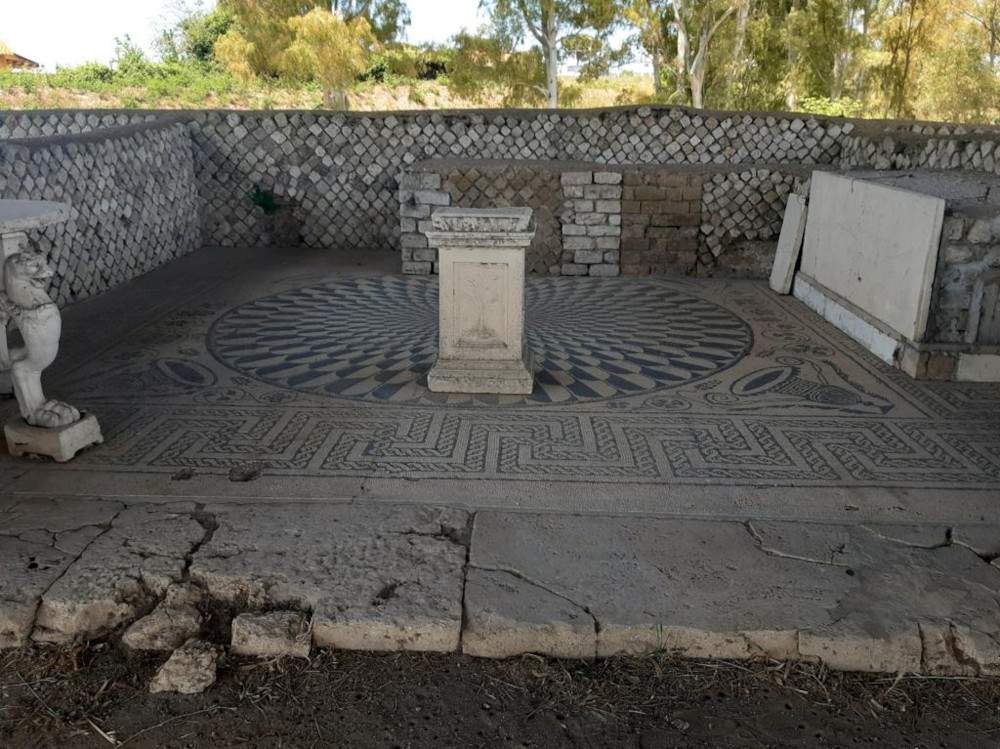Reopening the archaeological complex of Villa dei Volusii Saturnini, near Fiano Romano: this is the latest initiative of Autostrade per l’Italia - included in the Wonders project. Discover the Italy of Wonders, in collaboration with the Italian Touring Club, WWF, Slow Food Italia and the Italian National Commission for UNESCO - which highlights the company’s focus on enhancing territories and their many riches. Autostrade per l’Italia, through Wonders, is in fact committed to the enhancement and protection of Italian beauty, providing users with a unique travel experience and at the same time an active participation in the promotion of the riches of Italy’s cultural, naturalistic and food and wine heritage.
The company strongly wanted to focus on the revitalization of the Villa of the Volusii Saturnini, the suburban residential complex belonging to the Roman colony of Lucus Feroniae, which was discovered in 1961 during construction work on theRome-Florence Autostrada del Sole highway. The great Villa of the Volusii was built, organized on two levels, around the middle of the 1st century B.C. and stands above a natural terrace in an extraordinary panoramic position overlooking the lower Tiber valley. Thanks to the invaluable collaboration between Autostrade per l’Italia and the Ministry of Culture, Soprintendenza Archeologia Belle Arti e Paesaggio for the province of Viterbo and southern Etruria, the site has been enhanced with the aim of preserving and divulging its archaeological prestige and extraordinary artistic-cultural value. Today the site can be reached directly from theFeronia Ovest Service Area on the A1 near Fiano Romano.
Through the installation of touch points at the service area and with the support of digital tools, visitors are accompanied on the archaeological tour by anaudio guide that can be downloaded from QR codes at points of interest. The complex can be visited Tuesday through Saturday from 9 a.m. to 5 p.m. and Sundays and holidays from 9 a.m. to 2 p.m., year-round. To ensure the continuous opening, the Italian Touring Club, thanks to the support and collaboration of Autostrade per l’Italia, has gathered the availability of new volunteer members to welcome visitors with the Aperti per Voi project: places of art and culture are returned to citizens and tourists and made accessible thanks to the welcoming and informative orientation activities of TCI volunteer members. The Aperti per Voi project, launched in 2005, is active in 13 regions, 34 cities, with more than 80 places and 2,000 volunteer members, and has already made it possible to welcome more than 21 million tourists and citizens. In addition to allowing the opening, the Italian Touring Club, in agreement with the owners, “adopts” the sites by carrying out, where possible, concerts, guided tours, exhibitions, meetings and readings with the aim of promoting their appreciation and knowledge. "The Wonders project," says Autostrade per l’Italia CEO Roberto Tomasi, "reflects the heart of our strategic vision, which moves first and foremost from the idea of highway infrastructure as an engine for the growth of territories, a lever of their economic, natural and cultural strengths. Wonders values the experience of travel and the enhancement of the beauty found along our network. This initiative was born under the sign of inclusive sustainability and aimed at the revitalization of the territory, convinced that the business world plays a fundamental role in this game for the future of the country." As the superintendent, Margherita Eichberg, recalls, the Villa of the Volusii at Lucus Feroniae constitutes one of the best-known “country residences” that arose around Rome between the end of the republic and the beginning of the imperial age, made famous by the importance of its former owners, the Volusii Saturnini, a powerful senatorial family whose political and entrepreneurial rise is linked to the emperor Augustus and his successors. And he emphasizes how it was precisely the events that led to the discovery of the villa, which occurred during the course of work on the construction of the Autostrada del Sole highway, "that provided the occasion for the establishment, from the outset, of close cooperation between the Superintendence and the Società Autostrade with the signing, at the end of the 1990s, of a redevelopment agreement that constituted one of the first concrete applications of an operational model, unprecedented for those years, in which public and private parties concurred in the enhancement and enjoyment of the cultural heritage. The Superintendence, which is operational in the field of the valorization of the territory north of Rome, hopes that the systematic opening of the monument will contribute to its greater attendance by scholars, citizens and tourists, also to the benefit of the economy of culture, guides and tour operators."
Since 1894, the Italian Touring Club, an association of social promotion, has been taking care of Italy as a common good so that it may be better known, attractive, competitive and welcoming, helping to produce knowledge, protect and enhance the landscape, the artistic and cultural heritage and the economic-productive excellence of the territories, also through widespread volunteering. "The Aperti per Voi project,“ explains President Franco Iseppi, ”is a concrete example of this mission. We are pleased that, also for the splendid Villa dei Volusii, it has been possible to collaborate concretely in the continuous opening, thus raising awareness of the experience of active citizenship and spreading the awareness that the historical and artistic heritage of our country is a common good and it is everyone’s task to take care of it."
 |
| The archaeological site of Villa dei Volusii Saturnini, near Fiano Romano, reopens |
Warning: the translation into English of the original Italian article was created using automatic tools. We undertake to review all articles, but we do not guarantee the total absence of inaccuracies in the translation due to the program. You can find the original by clicking on the ITA button. If you find any mistake,please contact us.